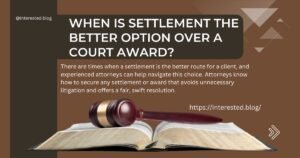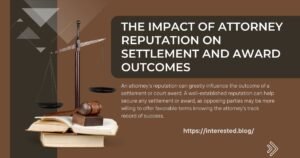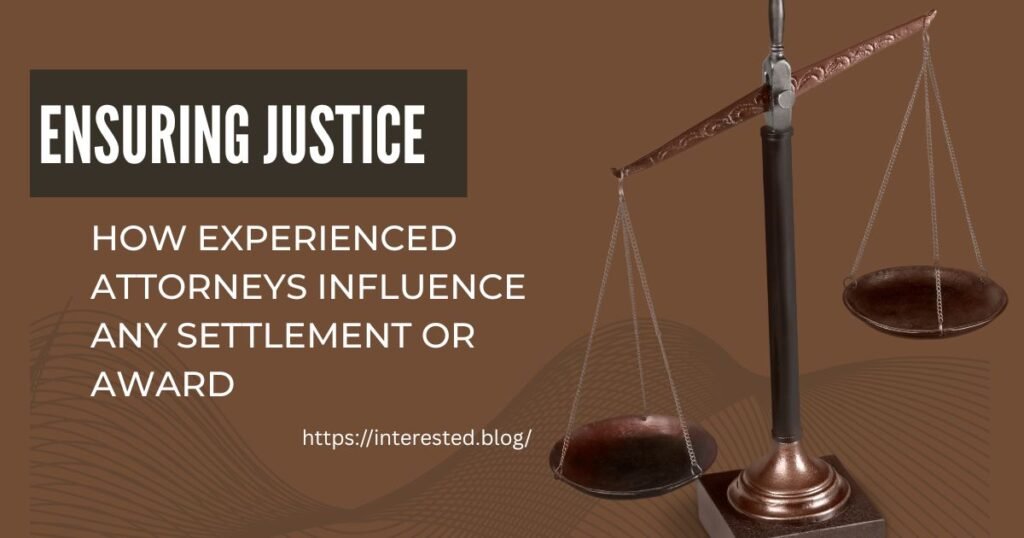Introduction
In the world of legal disputes, one of the most crucial aspects that determines the outcome of a case is whether it ends in a settlement or goes to court for a trial. Both legal settlements and awards can significantly impact a client’s future, financial security, and overall well-being. The difference often lies in the role of the attorney, their experience, and their ability to navigate the complex legal landscape. An experienced attorney can secure any settlement or award that meets the needs of their client.
Overview of Legal Settlements and Awards
Legal settlements are agreements reached between the parties involved in a dispute before the case goes to trial. In contrast, a court award occurs when a judge or jury determines the outcome of a case after litigation. The nature of both settlement and award can drastically shape the consequences for both plaintiffs and defendants, with the outcome often influenced by the role an attorney plays in securing any settlement or award.
Why Experienced Attorneys Are Essential in Securing Favorable Outcomes
An experienced attorney can make the difference between a satisfactory settlement and a significant court award. These professionals possess deep knowledge of legal precedents, negotiation tactics, and courtroom strategies, making them indispensable when seeking justice in legal matters. The ability to secure any settlement or award depends heavily on the skill set of the attorney involved.
Brief Explanation of the Article’s Goals and Structure
This article will explore the impact experienced attorneys have on legal settlements and awards. We will delve into the importance of legal expertise, negotiation skills, and the decision-making process in ensuring favorable outcomes for clients, including securing any settlement or award that is in their best interest.
What is a Legal Settlement and How Does it Differ from a Court Award?
Before we dive into the nuances of how experienced attorneys influence settlements and awards, it’s important to clearly understand what these terms mean. The difference between a settlement and a court award can often determine the final outcome, but a seasoned attorney can help secure any settlement or award that best suits the client.
Definition of a Settlement in Legal Terms
A legal settlement is a negotiated agreement between two parties to resolve a dispute without going to trial. The terms of the settlement are mutually agreed upon, and once accepted, both parties avoid the lengthy and costly process of litigation. An experienced attorney’s role in securing any settlement or award ensures that the client’s interests are met.
Key Differences Between a Settlement and a Court Award
- Control Over Outcome: In a settlement, both parties agree on the terms, while in a court award, the outcome is determined by a judge or jury. Attorneys strive to influence any settlement or award to benefit their clients.
- Speed and Cost: Settlements tend to be faster and less expensive than pursuing a court award.
- Finality: A settlement is typically final, whereas a court award can be appealed by either party.
How Settlements and Awards Impact the Plaintiff and Defendant
For plaintiffs, settlements provide a guaranteed outcome and avoid the unpredictability of a trial. Defendants may prefer settlements as they often result in lower costs and less reputational damage. However, when a case goes to court, an award could offer higher compensation, but with the risk of uncertainty. Securing any settlement or award comes down to effective legal representation.
The Power of Legal Experience: Why Expertise Matters in Securing Any Settlement or Award
An experienced attorney brings more than just legal knowledge to the table. They understand the art of negotiation and can assess when it’s best to push for a settlement or take a case to trial. A seasoned lawyer knows how to manage expectations, mitigate risks, and ensure the best possible outcome for their clients, including securing any settlement or award that is just.
How Attorneys’ Experience Shapes the Strategy for Settlements and Awards
The strategy an attorney employs during settlement negotiations or court trials can drastically influence the amount of compensation a client receives. Experienced attorneys know when to settle quickly, when to hold out for more, and how to read the opposing party’s intentions to maximize the settlement or award. Securing any settlement or award requires careful strategic planning.
Examples of Experienced Attorneys Impacting Legal Outcomes
- Personal Injury Cases: Experienced personal injury attorneys may push for higher settlements by leveraging expert testimony, medical records, and past case outcomes to negotiate a better deal.
- Corporate Disputes: In business litigation, an attorney’s familiarity with complex financial data and industry practices can help secure a more favorable settlement or court award, ensuring any settlement or award aligns with the client’s best interests.
Negotiating the Best Deal: How Attorneys Influence Settlement Amounts
An experienced attorney plays a pivotal role in securing the best settlement for their client. Here’s how they influence the process of any settlement or award.
The Role of an Attorney in Settlement Negotiations
Attorneys are not only legal experts but also skilled negotiators. They act as intermediaries between the client and the opposing party, ensuring that the terms of the settlement are favorable. A good attorney can de-escalate tensions and find mutually beneficial terms without the need for trial.
Key Negotiation Tactics Used by Experienced Attorneys
- Leverage of Evidence: Presenting strong evidence can compel the opposing party to offer a better settlement or award.
- Psychological Tactics: Skilled attorneys know how to use timing, emotion, and persuasive communication to sway the negotiations in their favor, ultimately securing any settlement or award that meets the client’s needs.
How Attorneys Assess the Right Time for Settlement Versus Litigation
Deciding when to settle and when to proceed to court is one of the most crucial decisions an attorney makes. This decision depends on factors like:
- The strength of the case
- The potential value of a court award
- The risks involved in litigation
When is Settlement the Better Option Over a Court Award?

There are times when a settlement is the better route for a client, and experienced attorneys can help navigate this choice. Attorneys know how to secure any settlement or award that avoids unnecessary litigation and offers a fair, swift resolution.
Situations Where Settlements Are More Beneficial Than Awards
- Speed and Certainty: Settlements can provide a faster resolution and a guaranteed payout, while court awards are unpredictable.
- Lower Risk: Settling removes the uncertainty of a trial and reduces the risk of losing the case altogether.
The Risks Involved in Pursuing a Court Award
- Appeals: A court award can be appealed, potentially prolonging the process.
- Unpredictable Outcomes: The court may award less than expected or, in some cases, nothing at all.
Why Attorneys Often Recommend Settlement in Certain Cases
An attorney may recommend a settlement if they feel the risks of litigation outweigh the potential rewards, or if the offer on the table is more than reasonable given the circumstances of the case.
Understanding the Settlement Process: What Clients Should Expect
Navigating the settlement process can be overwhelming. Here’s what clients can expect when working with an experienced attorney.
Step-by-Step Breakdown of How a Settlement Works
- Initial Consultation: The attorney reviews the case and provides an initial assessment.
- Negotiation: The attorney enters into settlement talks with the opposing party, armed with evidence and strategy.
- Agreement: If a deal is reached, the terms are formalized in a settlement agreement.
- Finalization: Once both parties sign the agreement, the case is concluded.
Key Players in the Settlement Process and Their Roles
- The Plaintiff: The person seeking compensation.
- The Defendant: The party being accused or sued.
- The Attorney: The representative negotiating the terms of the settlement.
- Insurance Companies: In some cases, insurers are involved in paying the settlement.
Common Pitfalls and How Experienced Attorneys Help Avoid Them
- Rushing to Settle: A rush to settle can result in a lower payout. An experienced attorney ensures that the settlement is fair.
- Inadequate Compensation: Attorneys ensure that all damages, including non-economic ones, are accounted for in the settlement.
Litigation or Settlement? The Critical Decisions Your Attorney Helps You Make
Choosing between litigation and settlement requires careful thought, and attorneys play a crucial role in this decision. Experienced attorneys help you navigate the complexities of any settlement or award, ensuring you make the right choice based on your case’s unique circumstances.
Factors Influencing the Decision to Settle Versus Pursue a Court Award
An attorney considers multiple factors, including:
- Strength of Evidence: Is the case strong enough to win in court?
- Cost of Litigation: What are the potential legal fees and other expenses?
- Time Constraints: How long will the case drag on if it goes to trial?
How Attorneys Evaluate the Potential Success of a Case in Court
Attorneys assess whether the case is likely to succeed in court based on legal precedent, the available evidence, and the behavior of the opposing party.
Impact of Case Complexity on Settlement Outcomes
More complex cases often warrant taking the case to court, while simpler cases may be better resolved through settlement.
How Attorneys Build a Strong Case to Maximize Settlement or Award
Experienced attorneys carefully build a case to ensure they can negotiate the best possible outcome. They utilize every tool at their disposal to secure any settlement or award that maximizes compensation and supports the client’s best interests.
Essential Elements for Building a Strong Case for Settlement or Award
- Detailed Evidence: This includes medical records, financial records, and expert testimony.
- Witness Testimony: Eyewitnesses and expert witnesses can strengthen the case.
Investigative Techniques and Expert Testimony
Skilled attorneys use investigative methods to uncover new evidence and hire expert witnesses who can testify on behalf of their client.
The Importance of Evidence and How Attorneys Organize It
Evidence is a cornerstone of both settlements and court awards. Attorneys know how to gather, present, and organize it to maximize its impact.
Personal Injury Cases: How Attorneys Ensure Fair Settlements and Awards
In personal injury cases, attorneys work tirelessly to ensure that clients are compensated for their injuries. They aim to secure any settlement or award that fully addresses the client’s medical bills, lost wages, and pain and suffering, ensuring fair compensation.
Common Personal Injury Cases and Settlement Strategies
- Car Accidents: Negotiating settlements that cover medical bills, lost wages, and pain and suffering.
- Medical Malpractice: Securing settlements that cover long-term care needs.
How Attorneys Advocate for the Injured Party
Attorneys representing injured clients use both legal knowledge and empathy to ensure that their clients receive the compensation they deserve.
Calculating Damages: What Goes into a Fair Settlement or Award?
Experienced attorneys consider both economic damages (like medical costs) and non-economic damages (such as emotional distress) to ensure a fair settlement or award.
The Importance of Communication: How Attorneys Advocate for Clients During Settlement Negotiations
Communication is key in ensuring a successful settlement or court award. Experienced attorneys use clear and effective communication to advocate for any settlement or award that aligns with the client’s needs and expectations.
How Attorneys Maintain Effective Communication with Clients During Negotiations
An attorney keeps the client informed about the progress of the case and ensures that their preferences are reflected in negotiations.
The Role of Attorney-Client Trust in Influencing Outcomes
Trust between an attorney and client is essential in making informed decisions about settlement offers and litigation strategies.
Negotiation Strategies Based on Communication Expertise
Experienced attorneys use clear, persuasive communication to achieve favorable outcomes in settlement negotiations.
The Impact of Attorney Reputation on Settlement and Award Outcomes

An attorney’s reputation can greatly influence the outcome of a settlement or court award. A well-established reputation can help secure any settlement or award, as opposing parties may be more willing to offer favorable terms knowing the attorney’s track record of success.
How the Reputation of an Attorney Can Affect Settlement Offers
A well-established attorney with a strong reputation may receive more favorable settlement offers from the opposing party, as they know the attorney’s capabilities in court.
The Role of a Well-Established Network in Legal Negotiations
An experienced attorney’s network of experts, mediators, and other professionals can be a huge asset in securing a favorable settlement or award.
Reputation and Its Influence on Opposing Parties’ Willingness to Settle
A respected attorney can often secure a better deal simply by being involved in the case, as the opposing party knows the attorney has the skills and knowledge to win in court.
Case Study 1: How an Experienced Attorney Secured a Record Settlement
In one high-profile personal injury case, a seasoned attorney helped a client secure a record settlement by leveraging expert medical testimony and a meticulous investigation. The lawyer’s negotiation strategy was based on showing the severity of the injuries and the long-term financial implications for the plaintiff.
Key Strategies Used in the Case
- Comprehensive evidence collection
- Expert witness testimony
- Effective communication with the opposing party
Lessons Learned from the Case for Future Settlements
This case demonstrated the power of thorough case preparation and aggressive negotiation.
Case Study 2: How Attorneys Influence a Court Award in Complex Litigation
In a complex corporate dispute, an attorney was able to secure a favorable court award for their client by presenting compelling evidence of breach of contract and financial damages. Their strategic approach ultimately led to securing any settlement or award that maximized the client’s compensation and addressed all aspects of the dispute.
Legal Challenges Faced and How the Attorney Overcame Them
- Documenting Breach of Contract: The attorney collected and organized thousands of pages of financial records.
- Overcoming Opposition: The attorney utilized expert testimony to counter the opposing party’s arguments.
The Impact of the Award on the Client and Lessons for Future Cases
The client received a significant award, and the case underscored the importance of legal expertise in complex litigation.
The Role of Mediation and Arbitration in Settlements and Awards
Alternative dispute resolution methods like mediation and arbitration can offer faster, less costly ways to resolve disputes. Attorneys skilled in these methods can help secure any settlement or award that is both favorable and efficient, minimizing the time and cost typically involved in litigation.
The Benefits and Drawbacks of Mediation and Arbitration
- Benefits: Quicker resolution, lower costs.
- Drawbacks: Limited ability to appeal outcomes.
How Attorneys Help Clients Navigate These Alternative Dispute Resolutions
Attorneys act as advocates during mediation or arbitration, ensuring that the client’s interests are protected and the outcome is fair.
How Attorneys Use These Methods to Influence Any Settlement or Award
Experienced attorneys know when to suggest mediation or arbitration, using their skills to steer the process towards a favorable outcome.
How Attorneys Help Maximize Compensation for Losses in Settlement and Award Cases
Maximizing compensation is one of the primary goals of any legal professional. Attorneys employ various strategies to ensure clients receive the compensation they are entitled to.
Calculating Compensation for Economic and Non-Economic Losses
Attorneys carefully calculate both tangible and intangible losses to ensure a fair settlement or court award.
The Strategies Used by Attorneys to Ensure Clients Receive Full Compensation
By leveraging expert testimony, detailed financial records, and negotiation skills, attorneys ensure that clients are compensated fully for their losses.
Legal Tools and Resources That Attorneys Leverage in Maximizing Compensation
- Expert evaluations
- Financial modeling
- Legal precedents
Attorney Fees and Costs: Understanding How They Affect Any Settlement or Award
When working with an attorney, clients must understand how fees and costs are structured in settlements and court awards. These fees can impact the final amount of any settlement or award, and experienced attorneys ensure that clients are aware of all costs involved to maximize their net compensation.
How Attorney Fees Are Structured in Settlements and Court Awards
In many cases, attorneys work on a contingency fee basis, meaning they only get paid if the client wins or settles the case.
The Role of Contingency Fees in Personal Injury and Similar Cases
Contingency fees allow clients to pursue justice without upfront costs. The attorney only receives a percentage of the settlement or award.
How Attorneys Manage Costs to Maximize Client Take-Home Amounts
Experienced attorneys manage legal costs effectively, ensuring that clients retain as much of their settlement or award as possible.
What Happens When a Settlement or Award is Insufficient?
Even after a settlement or award, clients may find the compensation insufficient. Attorneys can help pursue additional remedies.
Exploring the Option of Appealing a Settlement or Award
If a settlement or court award is inadequate, attorneys can advise on the possibility of appealing the decision.
How Attorneys Work to Correct Unjust Settlements or Awards
In cases where the settlement or award doesn’t meet the client’s needs, attorneys explore all legal avenues to secure a better outcome.
Steps Involved in Challenging a Settlement or Award and Their Risks
While challenging an award or settlement can be risky, experienced attorneys know when to take action and how to navigate the appeals process.
The Emotional Impact of Legal Settlements and Awards: How Attorneys Provide Support
Legal disputes can take an emotional toll on clients. Experienced attorneys play a critical role in providing support throughout the process. They help ensure that clients feel supported and guided, while also working towards securing any settlement or award that addresses their emotional and financial needs.
How Attorneys Act as Emotional Supporters During the Process
Attorneys not only offer legal advice but also emotional support, helping clients manage the stress and uncertainty of legal proceedings.
Balancing Legal Strategy with Client Well-Being
Attorneys understand the importance of balancing strategy with empathy, ensuring clients feel heard and supported.
How to Choose the Right Attorney to Maximize Your Settlement or Award
Choosing the right attorney is essential for achieving the best possible settlement or court award. A skilled attorney will know how to secure any settlement or award that aligns with your goals and ensures the best possible outcome based on their experience and expertise.
Key Factors to Look for in an Attorney When Seeking the Best Outcome
- Experience in similar cases
- Reputation and track record
- Expertise in negotiation and litigation
Questions to Ask Prospective Attorneys About Their Experience with Settlements and Awards
- “How many similar cases have you handled?”
- “What strategies have you used to maximize settlements?”
Red Flags to Avoid When Hiring an Attorney
- Lack of experience in handling settlement negotiations
- Unclear or hidden fee structures
Common Pitfalls in Settlement Negotiations and How Experienced Attorneys Avoid Them
Navigating the settlement process can be tricky, but experienced attorneys know how to avoid common mistakes. They ensure that clients do not settle for less than they deserve, securing any settlement or award that fully compensates their losses and protects their interests.
Common Mistakes Clients Make During Settlement Negotiations
- Rushing into a deal without understanding the full scope of damages.
- Accepting the first offer without negotiating.
How Experienced Attorneys Help Avoid These Pitfalls
Experienced attorneys ensure that clients understand every aspect of the settlement, helping them make informed decisions that lead to favorable outcomes.
Tips for Ensuring a Fair and Equitable Settlement or Award
- Ensure all damages are accounted for.
- Don’t accept the first offer if it’s too low.
The Future of Legal Settlements and Awards: What Clients Should Expect
The legal landscape is constantly evolving, and experienced attorneys adapt to these changes to ensure the best outcomes for their clients. As the methods of securing any settlement or award continue to evolve, attorneys stay informed and use the latest strategies to achieve the best possible results for their clients.
Trends in the Legal Industry That May Affect Settlements and Court Awards
- Digital Evidence: The rise of technology may change how evidence is presented in settlements and trials.
- Changes in Laws: Evolving laws could influence settlement and award amounts.
How Experienced Attorneys Adapt to Evolving Laws and Strategies
Attorneys stay up to date with the latest legal developments, ensuring they employ the most effective strategies for their clients.
Predictions for the Future of Legal Settlements and Awards
- More Alternative Dispute Resolution (ADR) options will be used.
- Increased use of technology will streamline settlement processes.
Final Thoughts
Attorneys play a crucial role in securing favorable outcomes for their clients, whether through settlements or court awards. Their experience, negotiation skills, and understanding of the law ensure that clients receive the best possible compensation for their losses. If you’re involved in a legal dispute, seeking an experienced attorney will increase your chances of a positive outcome.
FAQs:
Q. What is the main difference between a settlement and a court award?
A settlement is an agreement reached between the parties, while a court award is the decision made by a judge or jury after litigation.
Q. Why do attorneys prefer settlements in some cases?
Settlements provide a faster, less expensive, and more predictable resolution compared to the uncertainty of court trials.
Q. How can an attorney maximize my compensation in a settlement or award?
Attorneys use expert testimony, detailed evidence, and effective negotiation tactics to secure the highest possible compensation.
Q. What should I expect during the settlement process?
You can expect a thorough review of your case, evidence gathering, negotiation with the opposing party, and a formal agreement if a settlement is reached.
Q. What if I’m unhappy with my settlement or court award?
If you feel your settlement or award is insufficient, an attorney can help explore the option of appealing the decision or seeking further compensation.
Read More Content: fladderak roof management


